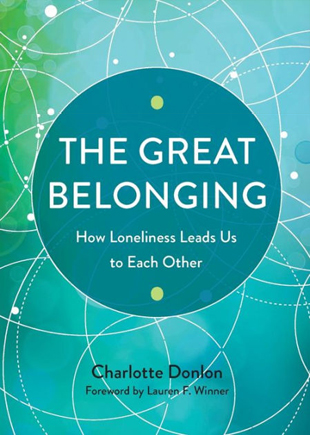"While most of the loneliness news from the past few years reports how bad it is for our health, some people have suggested loneliness can be beneficial. Therapist Karyn Hall has argued, 'Just as physical pain protects people from physical dangers, loneliness may serve as a social pain to protect people from the dangers of being isolated. It may serve as a prompt to change behavior, to pay more attention to relationships which are needed for survival.' And my friend and former therapist, Gordon Bals, recently said this about loneliness: 'I do think there is profound good in loneliness: It helps us reflect, make changes, seek more, and make space for God.'
"I have been fascinated by his statement since I first heard it. He's not speaking from a human survival standpoint. He's saying loneliness can help us grow spiritually. How can loneliness be generative? How can it help us reflect, make changes, seek more, and make space for God?
"When I began to give attention to loneliness, I did what I usually do when I process any complicated question: I wrote about it and read about it and talked about it. All the thinking, writing, reading, and talking have removed some of the power loneliness has had over me since I was a young child. My loneliness seems less oppressive, less consuming. It accompanies me for a few hours or a few days or a few weeks, instead of hiding in the shadows of my soul like a monster I don't want to acknowledge.
"Now my loneliness reminds me of the striking red-headed woodpecker, with its bright crimson head, black back, and white wing patches, which perched in the trees dotted around our former house. I never knew when the woodpecker would appear, but when it did show up, I noticed it. I watched it. I listened to it. I followed its path. (I realize more than one woodpecker may have appeared through the ten years we lived in that house. Please humor me and let me live my single-bird dream.)
"My reflections on loneliness have also led to more reflections on God, suffering, and hope. I've moved deeper into theological explorations and discussions with others who know a lot more about all of these topics than I will ever know. I've journaled and prayed and sat with God in the silence that comes with mystery.
"So as I reflect on my loneliness in conversations with others and God, I feel less alone. I'm not the only person who wants to understand hard things. We all want to know what God is doing. And while I don't have the answers I want, I do have the God I need.
"Reflecting on loneliness and belonging has also led to more thoughtfulness in how I relate to my friends and family in everyday life. I am more intentional about the conversations I have during coffee dates with friends, when I'm hanging out with my husband and my kids, and while I'm with our small group on Sunday nights. I've always appreciated Christian community and meaningful conversations, but somehow this greater awareness of my loneliness has led me to desire greater depth with others. I have more courage to ask about hidden things crawling around the shadowy places. I have more confidence to speak words of peace, hope, and encouragement to others. I have more gumption to demand my teenage kids sit still and listen to me read a poem or a short story or an essay to them at night before bed, because I know stories and poems and essays help us belong.
"I'm not saying my loneliness is all better now. I'm not saying it doesn't bother me anymore. But it is different. It's more approachable. It sometimes seems like a guide."
